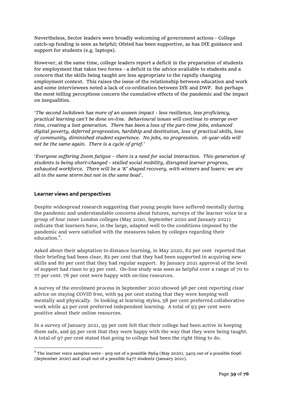
Page 39 of 76
Nevertheless, Sector leaders were broadly welcoming of government actions - College
catch-up funding is seen as helpful; Ofsted has been supportive, as has DfE guidance and
support for students (e.g. laptops).
However, at the same time, college leaders report a deficit in the preparation of students
for employment that takes two forms - a deficit in the advice available to students and a
concern that the skills being taught are less appropriate to the rapidly changing
employment context. This raises the issue of the relationship between education and work
and some interviewees noted a lack of co-ordination between DfE and DWP. But perhaps
the most telling perceptions concern the cumulative effects of the pandemic and the impact
on inequalities.
'The second lockdown has more of an unseen impact - less resilience, less proficiency,
practical learning can't be done on-line. Behavioural issues will continue to emerge over
time, creating a lost generation. There has been a loss of the part-time jobs, enhanced
digital poverty, deferred progression, hardship and destitution, loss of practical skills, loss
of community, diminished student experience. No jobs, no progression. 16-year-olds will
not be the same again. There is a cycle of grief.'
'Everyone suffering Zoom fatigue - there is a need for social interaction. This generation of
students is being short-changed - stalled social mobility, disrupted learner progress,
exhausted workforce. There will be a 'K' shaped recovery, with winners and losers: we are
all in the same storm but not in the same boat'.
Learner views and perspectives
Despite widespread research suggesting that young people have suffered mentally during
the pandemic and understandable concerns about futures, surveys of the learner voice in a
group of four inner London colleges (May 2020, September 2020 and January 2021)
indicate that learners have, in the large, adapted well to the conditions imposed by the
pandemic and were satisfied with the measures taken by colleges regarding their
education.
6
.
Asked about their adaptation to distance learning, in May 2020, 82 per cent reported that
their briefing had been clear, 82 per cent that they had been supported in acquiring new
skills and 80 per cent that they had regular support. By January 2021 approval of the level
of support had risen to 93 per cent. On-line study was seen as helpful over a range of 70 to
77 per cent. 76 per cent were happy with on-line resources.
A survey of the enrolment process in September 2020 showed 98 per cent reporting clear
advice on staying COVID free, with 94 per cent stating that they were keeping well
mentally and physically. In looking at learning styles, 58 per cent preferred collaborative
work while 42 per cent preferred independent learning. A total of 93 per cent were
positive about their online resources.
In a survey of January 2021, 95 per cent felt that their college had been active in keeping
them safe, and 95 per cent that they were happy with the way that they were being taught.
A total of 97 per cent stated that going to college had been the right thing to do.
6 The learner voice samples were - 909 out of a possible 8564 (May 2020), 3405 out of a possible 6096
(September 2020) and 2046 out of a possible 6477 students (January 2021).